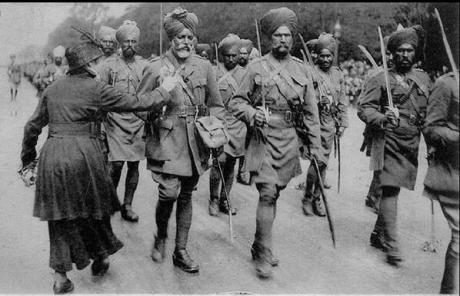The Science of Time
30 January 2013
Wednesday
F. H. Bradley in his classic treatise Appearance and Reality: A Metaphysical Essay, made this oft-quoted comment:
“If you identify the Absolute with God, that is not the God of religion. If again you separate them, God becomes a finite factor in the Whole. And the effort of religion is to put an end to, and break down, this relation — a relation which, none the less, it essentially presupposes. Hence, short of the Absolute, God cannot rest, and, having reached that goal, he is lost and religion with him. It is this difficulty which appears in the problem of the religious self-consciousness.”
I think many commentators have taken this passage as emblematic of what they believe to be Bradley’s religious sentimentalism, and in fact the yearning for religious belief (no longer possible for rational men) that characterized much of the school of thought that we now call “British Idealism.”
This is not my interpretation. I’ve read enough Bradley to know that he was no sentimentalist, and while his philosophy diverges radically from contemporary philosophy, he was committed to a philosophical, and not a religious, point of view.
Bradley was an elder contemporary of Bertrand Russell, and Bertrand Russell characterized Bradley as the grand old man of British idealism. This if from Russell’s Our Knowledge of the External World:
“The nature of the philosophy embodied in the classical tradition may be made clearer by taking a particular exponent as an illustration. For this purpose, let us consider for a moment the doctrines of Mr Bradley, who is probably the most distinguished living representative of this school. Mr Bradley’s Appearance and Reality is a book consisting of two parts, the first called Appearance, the second Reality. The first part examines and condemns almost all that makes up our everyday world: things and qualities, relations, space and time, change, causation, activity, the self. All these, though in some sense facts which qualify reality, are not real as they appear. What is real is one single, indivisible, timeless whole, called the Absolute, which is in some sense spiritual, but does not consist of souls, or of thought and will as we know them. And all this is established by abstract logical reasoning professing to find self-contradictions in the categories condemned as mere appearance, and to leave no tenable alternative to the kind of Absolute which is finally affirmed to be real.”
Bertrand Russell, Our Knowledge of the External World, Chapter I, “Current Tendencies”
Although Russell rejected what he called the classical tradition, and distinguished himself in contributing to the origins of a new philosophical school that would come (in time) to be called analytical philosophy, the influence of figures like F. H. Bradley and J. M. E. McTaggart (whom Russell knew personally) can still be found in Russell’s philosophy.
In fact, the above quote from F. H. Bradley — especially the portion most quoted, short of the Absolute, God cannot rest, and, having reached that goal, he is lost and religion with him — is a perfect illustration of a principle found in Russell, and something on which I have quoted Russell many times, as it has been a significant influence on my own thinking.
I have come to refer to this principle as Russell’s generalization imperative. Russell didn’t call it this (the terminology is mine), and he didn’t in fact give any name at all to the principle, but he implicitly employs this principle throughout his philosophical method. Here is how Russell himself formulated the imperative (which I last quoted in The Genealogy of the Technium):
“It is a principle, in all formal reasoning, to generalize to the utmost, since we thereby secure that a given process of deduction shall have more widely applicable results…”
Bertrand Russell, An Introduction to Mathematical Philosophy, Chapter XVIII, “Mathematics and Logic”
One of the distinctive features that Russell identifies as constitutive of the classical tradition, and in fact one of the few explicit commonalities between the classical tradition and Russell’s own thought, was the denial of time. The British idealists denied the reality of time outright, in the best Platonic tradition; Russell did not deny the reality of time, but he was explicit about not taking time too seriously.
Despite Russell’s hostility to mysticism as expressed in his famous essay “Mysticism and Logic,” when it comes to the mystic’s denial of time, Russell softens a bit and shows his sympathy for this particular aspect of mysticism:
“Past and future must be acknowledged to be as real as the present, and a certain emancipation from slavery to time is essential to philosophic thought. The importance of time is rather practical than theoretical, rather in relation to our desires than in relation to truth. A truer image of the world, I think, is obtained by picturing things as entering into the stream of time from an eternal world outside, than from a view which regards time as the devouring tyrant of all that is. Both in thought and in feeling, even though time be real, to realise the unimportance of time is the gate of wisdom.”
And…
“…impartiality of contemplation is, in the intellectual sphere, that very same virtue of disinterestedness which, in the sphere of action, appears as justice and unselfishness. Whoever wishes to see the world truly, to rise in thought above the tyranny of practical desires, must learn to overcome the difference of attitude towards past and future, and to survey the whole stream of time in one comprehensive vision.”
Bertrand Russell, Mysticism and Logic, and Other Essays, Chapter I, “Mysticism and Logic”
While Russell and the classical tradition in philosophy both perpetuated the devalorization of time, this attitude is slowly disappearing from philosophy, and contemporary philosophers are more and more treating time as another reality to be given philosophical exposition rather than denying its reality. I regard this as a salutary development and a riposte to all who claim that philosophy makes no advances. Contemporary philosophy of time is quite sophisticated, and embodies a much more honest attitude to the world than the denial of time. (For those looking at philosophy from the outside, the denial of the reality of time simply sounds like a perverse waste of time, but I won’t go into that here.)
In any case, we can bring Russell’s generalization imperative to time and history even if Russell himself did not do so. That is to say, we ought to generalize to the utmost in our conception of time, and if we do so, we come to a principle parallel to Bradley’s that I think both Russell and Bradley would have endorsed: short of the absolute time cannot rest, and, having reached that goal, time is lost and history with it.
Since I don’t agree with this, but it would be one logical extrapolation of Russell’s generalization imperative as applied to time, this suggests to be that there is more than one way to generalize about time. One way would be the kind of generalization that I formulated above, presumably consistent with Russell’s and Bradley’s devalorization of time. Time generalized in this way becomes a whole, a totality, that ceases to possess the distinctive properties of time as we experience it.
The other way to generalize time is, I think, in accord with the spirit of Big History: here Russell’s generalization imperative takes the form of embedding all times within larger, more comprehensive times, until we reach the time of the entire universe (or beyond). The science of time, as it is emerging today, demands that we almost seek the most comprehensive temporal perspective, placing human action in evolutionary context, placing evolution in biological context, placing biology is in geomorphological context, placing terrestrial geomorphology into a planetary context, and placing this planetary perspective into a cosmological context. This, too, is a kind of generalization, and a generalization that fully feels the imperative that to stop at any particular “level” of time (which I have elsewhere called ecological temporality) is arbitrary.
On my other blog I’ve written several posts related directly or obliquely to Big History as I try to define my own approach to this emerging school of historiography: The Place of Bilateral Symmetry in the History of Life, The Archaeology of Cosmology, and The Stars Down to Earth.
The more we pursue the rapidly growing body of knowledge revealed by scientific historiography, the more we find that we are part of the larger universe; our connections to the world expand as we pursue them outward in pursuit of Russell’s generalization imperative. I think it was Hans Blumenberg in his enormous book The Genesis of the Copernican World, who remarked on the significance of the fact that we can stand with our feet on the earth and look up at the stars. As I remarked in The Archaeology of Cosmology, we now find that by digging into the earth we can reveal past events of cosmological history. As a celestial counterpart to this digging in the earth (almost as though concretely embodying the contrast to which Blumenberg referred), we know that by looking up at the stars, we are also looking back in time, because the light that comes to us ages after it has been produced. Thus is astronomy a kind of luminous archaeology.
In Geometrical Intuition and Epistemic Space I wrote, “…we have no science of time. We have science-like measurements of time, and time as a concept in scientific theories, but no scientific theory of time as such.” Scientists have tried to think scientifically about time, but, as with the case of consciousness, a science of time eludes us as a science of consciousness eludes us. Here a philosophical perspective remains necessary because there are so many open questions and no clear indication of how these questions are to be answered in a clearly scientific spirit.
Therefore I think it is too early to say exactly what Big History is, because we aren’t logically or intellectually prepared to say exactly what the Russellian generalization imperative yields when applied to time and history. I think that we are approaching a point at which we can clarify our concepts of time and history, but we aren’t quite there yet, and a lot of conceptual work is necessary before we can produce a definitive formulation of time and history that will make of Big History the science and it aspires to be.
. . . . .
. . . . .
. . . . .
. . . . .

















